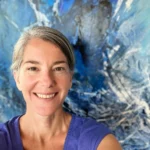My Approach
In my “Question + Art (Q+A) Books“, writing, artwork, and creative conversations about topics relating to grief and trauma, transracial adoption, or chronic illness, I try my best to embody the following values that I believe in:
I know that grief, illness, disability, and adoption experiences, expressions, and needs are as diverse as the people who experience them. I hold theory loosely. You are unique and I won’t stereotype you, assume I know your experience, or suggest that there’s a “right way” to live with these experiences.
I prefer to ask about my client’s experiences and interpretations and to keep their values, skills, and goals as the focus, rather than focusing on theoretical models of problems and professional prescriptions for their “treatment.”
I value written word, conversations, and experiences that nurture agency, belonging, and hope much more than conversations that are about the search for “accurate” diagnoses. Diagnoses can sometimes be validating or add useful information for consideration, but nobody is “textbook”, diagnoses don’t always offer answers, and you can always still act, decide, live, love, belong, and create a future that you look forward to without pinning down a diagnostic label.
I don’t care for a lot of the traditional ideas of what it means to be a “professional” therapist. Instead, I try to prioritise humility, relationship, and curiosity, I want my clients to feel at ease to speak frankly and give me critical feedback. I share vulnerably about my own experiences and struggles, and I allow myself to also reflect on my own life and I love that I will often be changed by our conversations.
I am committed to critiquing the ways that therapists, therapy and psychological theories may serve to maintain and police cultures of white supremacy, patriarchy, ableism, fat-phobia, and heteronormativity, and a culture that centres adoptive parents’ voices. I am committed to reflecting upon and unlearning these oppressive ideologies within myself and my own family life, and also in my work. I continue to work at learning from Black professionals who are decolonizing therapy and finding alternative ways to support healing and growth within an anti-racist and socially just paradigm, and I seek to learn from transracial adoptees about adoption.


